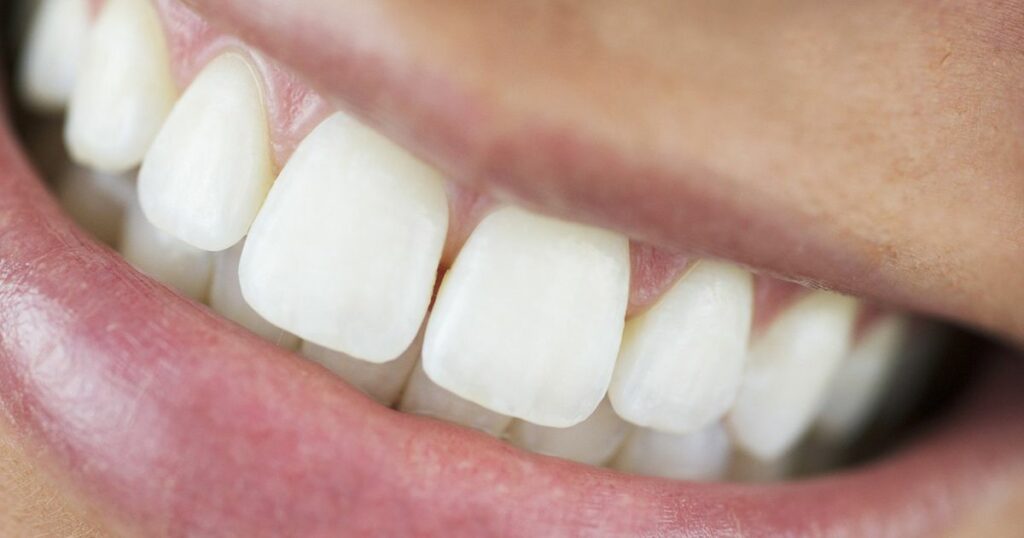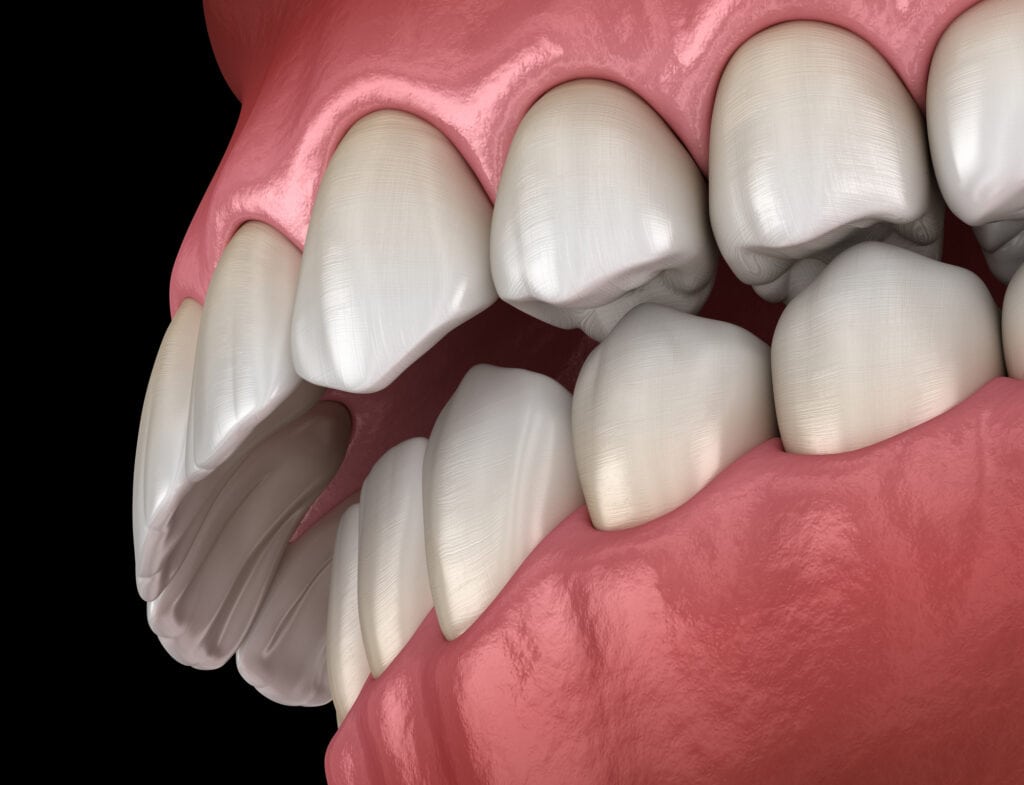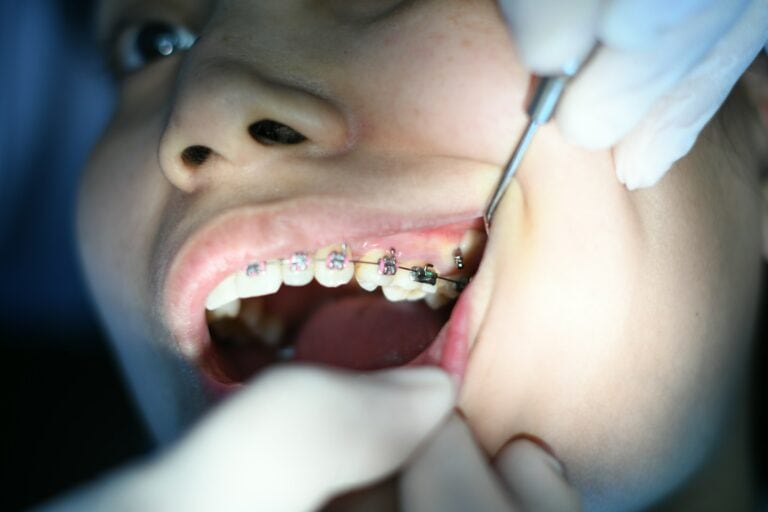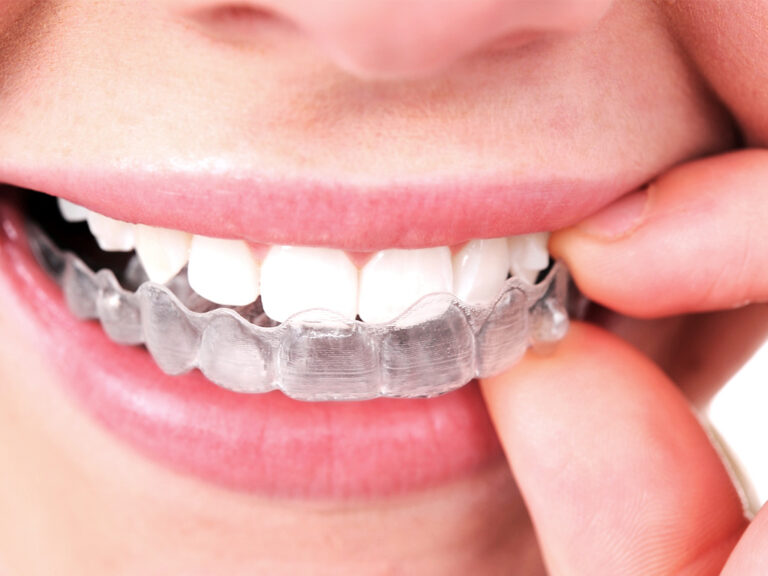What’s an Overbite? Signs, Causes, & Treatments
An overbite occurs when your upper front teeth overlap the lower front teeth. While a slight overbite (1-3 mm) is common and generally not a cause for concern, excessive overbites can lead to several health complications.

When the overlap is too pronounced, it may impact your ability to chew, speak, or breathe properly. If left untreated, it can result in long-term issues such as:
- Jaw pain
- Tooth decay
- Gum disease
- Temporomandibular Joint (TMJ) disorders
- Speech difficulties
Minor overbites are natural and manageable, but more severe cases require orthodontic treatment to restore proper alignment and avoid further complications. Early intervention is key to ensuring that a small issue doesn’t turn into a more significant problem.
If you’re concerned about your bite or noticing any discomfort, it’s important to seek professional guidance. An orthodontist can help determine whether treatment is necessary to maintain a healthy, functional smile.
Read next: What is the Orthodontics Treatment Process Like?
What’s an Overbite?
An overbite is a dental condition that happens when your upper front teeth overlap your lower front teeth. Overbites are quite common, but it’s important to know the severity of your overbite.
- A slight overlap (1-3 mm) is normal and generally does not cause problems.
- Anything beyond this, such as a deeper overlap, can become problematic and may require orthodontic treatment.

A similar issue to an overbite, but different, is an overjet:
- Overbite: the vertical overlap between the upper and lower teeth.
- Overjet: the horizontal distance between the upper and lower teeth.
Overbite issues can vary in severity, from mild cases that are hardly noticeable to severe conditions that may affect the alignment of the teeth and overall oral health.
While a minor overbite might not need treatment, excessive or problematic overbites can result in discomfort or more serious dental issues, making early detection and treatment vital.
Read next: When Should Your Child See An Orthodontist?
Types of Overbite
There are several different types of overbite, each with unique causes and treatment options:
- Skeletal Overbite: Caused by irregular jaw growth, where the lower jaw is smaller than the upper jaw, leading to misalignment of the bite.
- Dental Overbite: Occurs when the teeth themselves are misaligned, often due to overcrowding or tooth loss, creating an excessive overlap.
- Combination Overbite: A mix of both skeletal and dental factors, where the jaw and teeth contribute to the problem.
- Impinging Overbite: The most severe type, where the lower teeth hit the roof of the mouth behind the upper teeth, leading to significant damage if untreated.
Each type varies in severity and requires different treatment methods. Consulting an orthodontist can help determine the best course of action, whether through braces, clear aligners, or even surgery for severe cases.
Causes of Overbite
Overbites can occur for several reasons, ranging from genetics to oral habits. Understanding the causes can help identify the best treatment options.
- Genetics: Many overbites are hereditary, meaning they are passed down from parents to children. If your family has a history of overbites, there’s a higher chance you might develop one as well. The size and shape of your jaw and teeth can affect your bite, making overbites more common.
- Oral Habits: Certain habits during childhood can contribute to the development of an overbite. These include:
- Thumb sucking past infancy
- Prolonged pacifier use after age 3
- Nail biting, which can alter tooth alignment over time
- Teeth Misalignment: Overcrowding or the loss of teeth, especially at an early age, can lead to misalignment. When teeth shift, they can cause the upper teeth to overlap the lower teeth more than usual.
- Jaw Size Issues: A small lower jaw compared to the upper jaw can also contribute to an overbite. This skeletal misalignment leads to the upper teeth covering the lower teeth excessively.
Each of these causes contributes to the severity of the overbite, so it’s important to consider them when seeking treatment.
What Happens If an Overbite Is Left Untreated?
If an overbite is left untreated, it can lead to various health issues that affect your daily life.
- Tooth Decay: The misalignment caused by an overbite can make it harder to clean your teeth properly, leading to an increased risk of cavities and tooth decay.
- Gum Disease: Misaligned teeth may lead to gum recession or disease due to difficulty cleaning around the gums.
- TMJ Issues: Temporomandibular Joint (TMJ) problems can occur, causing pain in the jaw, face, or neck, along with clicking sounds when moving the jaw.
- Difficulty Chewing or Speaking: An overbite can make it harder to chew food properly and might even affect your speech.
- Jaw Pain and Headaches: Continuous strain on the jaw muscles can result in chronic jaw pain, tension, and headaches.
Early treatment is crucial to prevent these complications. Seeking orthodontic help as soon as possible can help you avoid serious dental and health issues in the future.
Overbite Symptoms
If you have an overbite, you may notice several symptoms that affect your daily life. Common signs include:
- Difficulty opening or closing the mouth: A misaligned bite can make it challenging to fully open or close your mouth, affecting normal jaw movement.
- Jaw pain: Particularly when chewing, you might experience jaw pain due to the strain caused by the improper alignment of the teeth and jaws.
- Speech changes: An overbite can cause difficulty with speech, making certain sounds harder to pronounce clearly.
- Breathing difficulties: Severe overbites can affect the alignment of the airway, leading to breathing issues, especially when sleeping.
- Teeth grinding (bruxism): The misalignment may cause your teeth to rub together when you sleep, leading to teeth grinding, which can damage your teeth and cause additional jaw pain.
If you’re experiencing any of these symptoms, it’s important to consult with an orthodontist for evaluation and treatment options.
How to Correct an Overbite
Correcting an overbite depends on the severity and cause of the issue. There are several treatment options available, each suited to different needs:
- Braces: Traditional metal braces are commonly used for more severe overbites. They use wires and brackets to move the teeth into proper alignment. This method is highly effective but may take longer for complex cases.
- Invisalign: For mild to moderate overbites, clear aligners like Invisalign are a discreet and comfortable option. These aligners gradually shift the teeth over time, offering a less noticeable alternative to traditional braces. However, they may not be suitable for severe overbites.
- InBrace: InBrace treatment uses braces that are placed behind the teeth, offering a more discreet solution for those who want orthodontic treatment without visible braces. This option works well for mild to moderate cases and offers comfort and better aesthetics.
- Jaw Surgery: In severe cases, particularly with skeletal overbites, corrective jaw surgery may be necessary. This surgery realigns the jaw to correct misalignment and is often paired with orthodontic treatment for optimal results.
A consultation with an orthodontist is crucial in determining the best treatment plan for your specific overbite. The orthodontist will assess the severity, cause, and your personal preferences to create a customized solution. Early intervention can prevent future complications and lead to better long-term results.
Why Seek Treatment for an Overbite?
Treating your overbite is essential for both oral health and your overall well-being. Here’s why treatment is important:
- Prevent further dental complications: Untreated overbites can lead to tooth decay, gum disease, and TMJ disorders, causing long-term damage to your teeth and jaw.
- Enhance self-esteem and appearance: A misaligned bite can affect the appearance of your smile, leading to a decrease in confidence. Correcting an overbite can improve your facial profile and boost self-esteem.
- Improve chewing, speaking, and breathing: Overbites can make it difficult to chew food properly, speak clearly, or breathe easily. Treatment helps restore the proper function of your mouth, making everyday activities more comfortable.
By addressing an overbite early, you can prevent serious complications and enjoy a healthier, more confident smile. An orthodontist can help you choose the best treatment plan for your needs. If you’re located in Longmont or Boulder, we recommend Dr. Ross at Longmont Braces– reach out for a free consultation!
FAQ Section
What causes an overbite?
Overbites are often caused by a combination of genetic factors, oral habits, and jaw misalignment. Common causes include thumb sucking, prolonged pacifier use, and misaligned teeth or jaw.
Can an overbite get worse?
Yes, if left untreated, overbites can worsen over time, leading to more severe dental and health problems. These may include tooth decay, gum disease, and jaw pain.
Is overbite treatment covered by insurance?
It depends on the insurance plan, but many dental plans do cover orthodontic treatments for overbite correction. It’s important to check with your insurance provider to confirm your coverage.
How long does it take to correct an overbite?
Treatment time varies depending on the severity of the overbite and the type of treatment chosen. Typically, it takes about 18 to 24 months to correct an overbite with braces or aligners.
Can I treat an overbite without braces?
Mild overbites may be treatable with clear aligners like Invisalign, offering a more discreet option. However, more severe cases may require traditional braces or even jaw surgery to achieve the best results.




